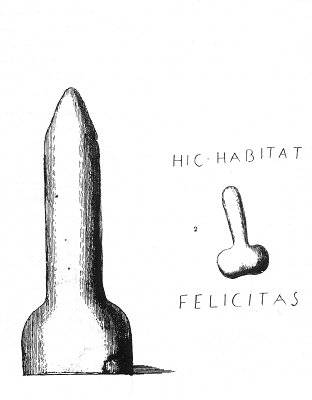| honeybee ( @ 2003-06-03 03:43:00 |
|
|
|
|
|
|
|
|
|
|
|
|
|
|
Sensenos laikos Pompejās kāds gudrinieks uzzīmējau uz sienas (jau nu nē, bet kaut kādas akmens plātnes) peni un pierakstīja - hic habitat felicitas (tip šeit mīt laime). IMHO, parasts huligānisma akts, ko katrā otrajā autobusa pieturā var novērot. Šobrīd attiecīgais mākslas darbs atrodas muzejā, un gudrās grāmatās raksta par tā simbolisko jēgu & nozīmi. :)
Priapus was the protector of gardens; it was he who kept off the thieves from them. Devout persons thought it sufficient for that purpose to place his statue and attributes on the limits of their property; but a certain area of land could not have been protected equally on all sides by it small number of these statues, and the multiplication of them would have rendered the precaution too costly; their place was supplied by coarse images of the nature of that which is represented here.
As we have already said, the attributes of the garden god were accounted sure preservatives against the influence of evil-disposed persons, of magicians, and sorcerers; and this belief is still prevalent in the East, in Italy, and in Spain. It must not, then, be wondered at that at a period when this worship was freely admitted into the palaces of the great and rich, there should be found a humble artisan who had the notion of placing on his stall the protecting image of this singular god. Hic habitat felicitas, here happiness dwells; it is in the shelter of this revered image that we live exempt from trouble and care.

Priapus was the protector of gardens; it was he who kept off the thieves from them. Devout persons thought it sufficient for that purpose to place his statue and attributes on the limits of their property; but a certain area of land could not have been protected equally on all sides by it small number of these statues, and the multiplication of them would have rendered the precaution too costly; their place was supplied by coarse images of the nature of that which is represented here.
As we have already said, the attributes of the garden god were accounted sure preservatives against the influence of evil-disposed persons, of magicians, and sorcerers; and this belief is still prevalent in the East, in Italy, and in Spain. It must not, then, be wondered at that at a period when this worship was freely admitted into the palaces of the great and rich, there should be found a humble artisan who had the notion of placing on his stall the protecting image of this singular god. Hic habitat felicitas, here happiness dwells; it is in the shelter of this revered image that we live exempt from trouble and care.

